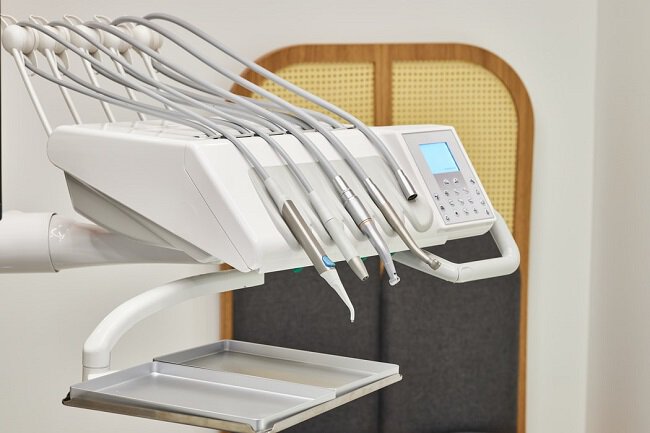


Dentophobia is the fear of going to the dentist or having any oral procedures done. Roughly 77 out of every 1000 individuals suffer from some form of dentophobia.
It is important to understand the difference between a phobia and a general dislike, though. General dislikes and anxiety do not lead to the overwhelming physical sensations that phobias do, and they do not have as strong of a mental trigger or response. A phobia, though, is generally rooted in the psyche and can be attributed to something from the past.

Even the sight of dental instruments can be enough to instill fear. Photo by
Engin Akyurt on Unsplash.
Dentophobia most often can be attributed to a previous traumatic event at the dentist. It can also come about indirectly, such as when a family member relays a negative experience, or when media illustrates dental offices as uncaring and procedures as extremely painful.
As a result, you enter a vicious cycle. Because of the fear, you’ll avoid going to the dentist for months or years, which will cause your dental health to deteriorate. You may not get necessary procedures and you could very well cause greater issues to come into fruition. After avoiding treatment, you’ll feel guilty or ashamed that you couldn’t go, which will then reinforce the refusal to make the trip. You won’t want to face your dentist, and now that the problems have progressed, you won’t want to go through the additional pain or extra procedures – not to mention the cost may increase over time the longer you delay treatment.
Thus, it is extremely important that you seek out help for your dentophobia before it’s too late and you indirectly cause irrevocable damage to your teeth and mouth.
Dentophobia can manifest in many ways. You might have a single fear or a number of fears; you may be easily overwhelmed by any of these symptoms. The important thing to remember is that phobias are often irrational, and you can overcome them with specific techniques. A few of the common fears associated with dentophobia include:
If you find yourself physically struggling to enter a dentist’s office, or if you have a heavy sense of dread when imagining a dental procedure, you may have dentophobia. Some people become paralyzed from their fear and anxiety, or they outright run away, which can lead to numerous dental problems down the line. A few of the indicators that you’re having an attack stemming from dentophobia include:

Find a dentist who makes you comfortable! Photo by Jose Vazquez on Unsplash.
Dentophobia, like any phobia, can be alleviated by a number of techniques that can help patients control their fear and overcome it. It is best, however, to consult with a psychologist as well as a dentist to determine the best course of action. Always reach out to your dentist ahead of time to explain that you suffer from dentophobia and that you’d like to work together to deal with it. Some techniques that can help reduce the effects of dentophobia include:
Other psychological techniques can also be used outside of the dental office. For example, overstimulation involves being presented with the stimulus that triggers anxiety in the hope that it will diminish the negative response.
In extreme cases, sedatives may be used, but general anesthesia can only be used in a hospital. Anxiety medication can be used, but side effects are always possible.
Even though TMJ disorder can be painful and wreak havoc on your life, it’s still crucial that you get the help you need. Fearing the dentist will make it hard for you to overcome the daily pain and discomfort you feel. Dr. Eddie Siman is here to help ease you into treatment and make sure you are as comfortable as possible with every visit. Because of Dr. Siman’s holistic background, he knows how important it is for each and every patient to be relaxed and attentive to their own bodies. Reach out to our Los Angeles dental practice or contact us today if you’re in need of treatment for your TMJ disorder. We can help accommodate your dentophobia and make sure you get the relief you need.
Dr. Eddie Siman has over 35 years of experience and is a premier TMJ and Sleep Apnea expert in Los Angeles and Orange County. Many come to Dr. Eddie Siman with severe tinnitus, migraine problems, and sleep apnea with no relief in sight. Little do these patients know that their painful symptoms are tied to the Temporomandibular joint (TMJ). Think outside the box and pay a simple visit to Dr. Siman today so you can finally find the source of all your pain and get rid of it once and for all.
Schedule your Private Consultation and Diagnosis Appointment with Dr. Siman Expert TMJ, Cosmetic Dental, and Sleep Apnea Treatments.
Call today (818) 574-5009
14629 Ventura Blvd, Sherman Oaks, CA 91423
414 N. Camden Drive Suite #1240, Beverly Hills, CA 90403